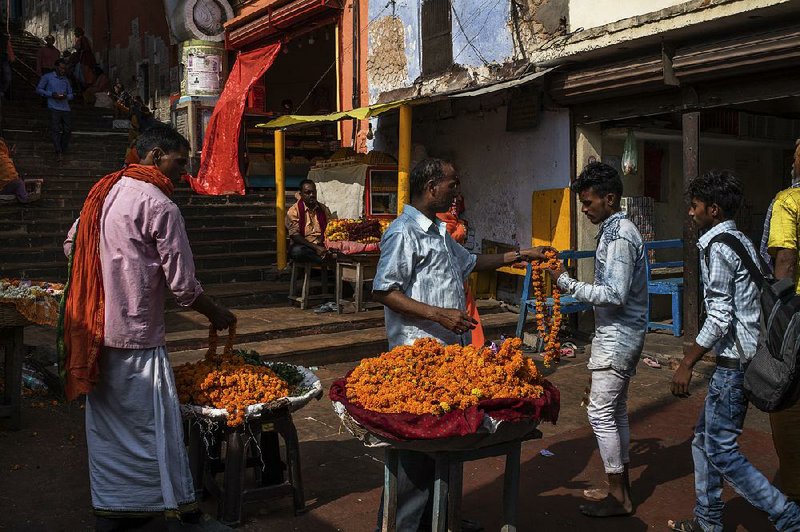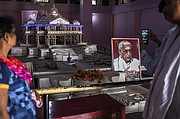NEW DELHI -- India's Supreme Court ruled in favor of Hindus on Nov. 9 in a decades-old dispute over a holy site contested by Muslims, handing the prime minister and his followers a major victory in their quest to remake the country as Hindu and shift it farther from its secular foundation.
The ruling approved construction of a Hindu temple on a site where a mosque had stood before Hindu devotees destroyed it in 1992 with sledgehammers and their bare hands. The demolition of the Babri Mosque in the city of Ayodhya set the tone for sectarian tensions that haunt India today.
The prime minister, Narendra Modi, and his Bharatiya Janata Party swept India's elections in May by campaigning on a Hindu nationalist agenda, and the court case became an emotionally charged flashpoint. The party cast its quest to build a temple as a key step in establishing India as Hindu, wiping away centuries of oppression at the hands of the Muslim Mughal Empire and British colonialists.
Many Hindus believe that the disputed site was the birthplace of their revered god Ram and that an earlier temple was demolished during Mughal rule to build the mosque. The case has been in Indian courts since the 1950s, but when it reached the Supreme Court in 2010, the deity Ram was given legal standing, pitting the god Hindus revere most against the country's Muslim population.
"Today's message is to unite, to associate and to live together," Modi said after the ruling in an address to the nation Nov. 9. "In the new India, fear, animosity and negativity should have no place."
In its highly anticipated ruling, the five-judge panel unanimously decided that the sliver of barren land in question -- barely 3 acres -- would be placed in a government-run trust. The decision allows Hindus to construct a temple, which they have planned since the Babri Mosque was destroyed.
The court also ruled that Muslims would be given 5 acres to build a mosque at a prominent site in Ayodhya, the town at the center of the dispute, in the northern state of Uttar Pradesh.
When the Babri Mosque was demolished by Hindu extremists, it set off riots across the country that killed some 2,000 people in some of the worst violence India had seen since its bloody partition in 1947. In place of the mosque, Hindus erected a tent resembling a temple, which still stands and draws thousands of tourists every day.
The mosque was built in the 1500s during Mughal rule, a time of Muslim occupation. Although sites like the Taj Mahal -- also built under the Mughals -- are considered famous symbols of India, conservative Hindus see them as testaments to past oppression.
Some Hindu nationalists want to erase that history and replace it with symbols that reinforce India as a Hindu nation. About 80% of India's population is Hindu.
"Post the independence of our country, we have erased all the symbols of British imperialism," said Ram Madhav, general secretary of the Bharatiya Janata Party. "The names of our roads have been changed, the statues of Queen Elizabeth and all of them have been removed."
India should undergo a similar exorcism of certain symbols of Mughal rule, including the Babri Mosque, Madhav said, calling the 300-year reign of the Mughal Muslim emperors "cruel."
In Ayodhya, just yards from the disputed site, Indian sadhus -- Hindu's holy people -- shouted, "Praise mother India," while devotees passed out sweets to mark the victory. But not all pockets of Ayodhya were filled with jubilation.
Much of the town's Muslims kept off the streets and tried to keep their heads down. Some appeared to hope that now that the decadeslong court decision had been settled, the sectarian tensions that have become a way of life in Ayodhya would finally ease.
Iqbal Ansari , a resident of Ayodhya whose father was a litigant in the case and had demanded the Babri Mosque be restored, said he welcomed the decision and hoped it would end years of sectarian strife.
"We should stop seeing each other from the religious prism," he said. "The court's verdict is final, and we will not appeal against it."
Modi's government praised the ruling but was quick to call for unity and warned Hindus against boisterous celebrations for fear they would set off clashes. While India under Modi has adopted a Hindu tilt, the prime minister has also focused on raising India's profile on the international stage.
Officials in Delhi have been dismayed by the persistent news coverage of India's sectarian disharmony, including anti-government protests in the Muslim-majority state of Jammu and Kashmir, which was stripped of its autonomy in August.
In the hours after the Nov. 9 ruling, India's Muslims were divided between those who want to contest the decision and those who want to move on for the sake of sectarian harmony. Those who want to contest it have come to see the restoration of the Babri Mosque as a proclamation of Muslims' place in India, and they fear that more religious sites will be targeted for destruction.
After the court announced its verdict, senior government officials called journalists in and promised -- anonymously -- that no more mosques would be destroyed and that they, too, wanted to move on and focus on building the nation. Before this year's election, Modi promised to deliver ambitious growth, to make India a $5 trillion economy by 2025. But growth so far has been sluggish, with unemployment reaching a 45-year high.
Religion on 11/16/2019


